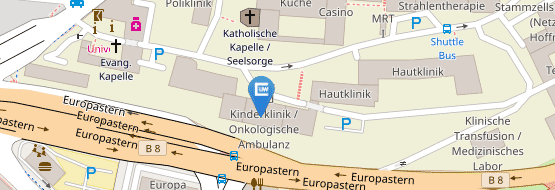PD Dr. Karin Meng
PD Dr. rer nat. Karin Meng

kurzer Lebenslauf
| seit 2020 | Mitglied im wissenschaftlichen Beirat des Zentrum Patientenschulung und Gesundheitsförderung e.V. |
| 2020 | Habilitation, Priv.-Doz., Universität Würzburg |
| seit 2019 | Wissenschaftliche Mitarbeiterin am Institut für Klinische Epidemiologie und Biometrie an der Universität Würzburg |
| 2015-2019 | Mitglieder der Kommission Qualitätssicherung der Deutschen Gesellschaft für Prävention und Rehabilitation von Herz- Kreislauferkrankungen e.V. (DGPR) |
| Seit 2005 | Train-the-Trainer-Seminare für Patientenschulungsprogramme |
| 2003-2019 | Wissenschaftliche Mitarbeiterin, Abteilung Medizinische Psychologie und Psychotherapie, Medizinische Soziologie und Rehabilitationswissenschaften, Universität Würzburg |
| 2004 | Promotion zum Dr. rer. nat., Universität Salzburg |
| 2001-2003 | Weiterbildung zur Klinischen Psychologin und Gesundheitspsychologin; Akkreditierung am 22.05.2003 |
| 2000-2003 | Mitarbeiterin der Beratungsstelle für Klinische Psychologie, Psychotherapie, Gesundheitspsychologie am Institut für Psychologie, Universität Salzburg Mitarbeiterin der Testothek und Computerdiagnostik, Universität Salzburg |
| 1994-2000 | Diplomstudium Psychologie, Universität Salzburg |
wissenschaftliche Schwerpunkte
Patientenschulung, Selbstmanagement, Patientenkompetenz, Gesundheitsverhalten Rehabilitationswissenschaften, Versorgungsforschung
Laufende Projekte:
Verlaufseffekte bei Rehabilitanden mit peripherer arterieller Verschlusskrankheit in der spezialisierten Rehabilitation (VER-PAVK; 01/20 - 12/22)
Wirksamkeit der verhaltensmedizinisch orientierten Rehabilitation mit divergierenden psychologischen Gruppenansätzen bei Rehabilitanden mit chronischen Rückenschmerzen (VOR-psy; 01/20 – 12/22; verlängert bis 06/23); erweitert um Teilstudie: Einfluss der Coronavirus (COVID-19) Pandemie auf die verhaltensmedizinisch-orientierte Rehabilitation (VOR-Pan)
Unterstützung einer Lebensstiländerung durch Angehörige: Relevanz und Bedarfe von kardiologischen und orthopädischen Rehabilitanden sowie deren Angehörigen (04/2019-10/2019; verlängert bis 11/2019); aktuell Auswertung
Transsektorale Entwicklung der Patientenkompetenz bei Frauen mit Brustkrebs und gynäkologischen Tumoren (02/2019-01/2022)
Entwicklung und formative Evaluation von Seminarbausteinen zu gesunder Ernährung und Fortbildungen für die Ernährungsberatung in der medizinischen Rehabilitation (SErFo; 07/2017 – 07/2020)
Nicht geäußerte behandlungsrelevante Bedürfnisse, Belastungen und Befürchtungen bei Krebspatientinnen und –patienten in der onkologischen Rehabilitation (01/2017 – 12/2019; verlängert bis 03/2020)
Hauptpublikationen der letzten Jahre
Eine Übersicht aller Projekte und Publikationen im PDF format finden Sie hier.
-
. Patients’ perceived challenges, competencies, and supportive care needs during acute clinical treatment of breast or gynecological cancer. Psychooncology. 2023;.
- [ DOI ]
-
. Patientenkompetenz zur Krankheitsbewältigung – Eine qualitative Analyse bei Frauen mit Brustkrebs und gynäkologischen Tumoren [Patient Competence for Coping with Disease - A Qualitative Analysis in Women with Breast and Gynaecological Cancer]. Psychother Psychosom Med Psychol [Internet]. 2023;73(05):187-96. Available from: http://www.thieme-connect.de/products/ejournals/abstract/10.1055/a-1956-9153
- [ DOI ]
-
. Patients’ challenges, competencies, and perceived support in dealing with information needs – A qualitative analysis in patients with breast and gynecological cancer. Patient Education and Counseling [Internet]. 2022;105(7):2382-90. Available from: https://www.sciencedirect.com/science/article/pii/S0738399121007837
- [ DOI ]
-
. Patients’ challenges, competencies, and perceived support in dealing with information needs – A qualitative analysis in patients with breast and gynecological cancer. Patient Education and Counseling [Internet]. 2021;105(7):2382-90. Available from: https://www.sciencedirect.com/science/article/pii/S0738399121007837
- [ DOI ]
-
. Cardiac rehabilitation in German speaking countries of Europe—evidence-based guidelines from Germany, Austria and Switzerland LLKardReha-DACH—part 2. Journal of Clinical Medicine. 2021;10(14):3071.
-
. Patients’ challenges, competencies, and perceived support in dealing with information needs - A qualitative analysis in patients with breast and gynecological cancer. Patient Educ Couns. 2021;105(7):2382-90.
- [ DOI ]
-
. Endurance and avoidance response patterns in pain patients: Application of action control theory in pain research. PLOS ONE [Internet]. 2021;16(3):e0248875. Available from: https://doi.org/10.1371/journal.pone.0248875
- [ DOI ]
-
. Decreased mental health, quality of life, and utilization of professional help in cancer patients with unexpressed needs: A longitudinal analysis. Psycho-Oncology [Internet]. 2021;31(5):725-34. Available from: https://doi.org/10.1002/pon.5856
- [ DOI ]
-
. Unexpressed psychosocial needs in cancer patients at the beginning of inpatient rehabilitation: a qualitative analysis. Journal of Psychosocial Oncology [Internet]. 2021;39(2):173-88. Available from: https://doi.org/10.1080/07347332.2020.1819931
- [ DOI ]
-
. Volitional Action Control and Depression in Chronic Pain: Does Action versus State Orientation Moderate the Relations of Pain-Related Cognitions to Depression?. Current Psychology [Internet]. 2021;42(9):7591-608. Available from: https://doi.org/10.1007/s12144-021-01914-1
- [ DOI ]
-
. Health literacy bei onkologischen Rehabilitanden und deren Relevanz für den subjektiven Rehabilitationsverlauf [The Impact of Health literacy on Health Outcomes in Cancer Patients Attending Inpatient Rehabilitation]. Die Rehabilitation. 2021;60(02):102-9.
- [ DOI ]
-
. Motivation und Schulung in der kardiovaskulären Rehabilitation. Herzmedizin. 2021;5:37-40.
-
. [Seminar modules on healthy nutrition in medical rehabilitation. Results of the formative evaluation of a training program on the use of the modules and of practical implementation by nutrition professionals]. ErnährungsUmschau. 2021;68(9):174-80.
- [ DOI ]
-
. Cardiac Rehabilitation in German Speaking Countries of Europe—Evidence-Based Guidelines from Germany, Austria and Switzerland LLKardReha-DACH—Part 1. Journal of Clinical Medicine [Internet]. 2021;10(10):2192. Available from: https://www.mdpi.com/2077-0383/10/10/2192
-
. Prevalence and predictors of cancer patients’ unexpressed needs in the admission interview of inpatient rehabilitation. Psycho-Oncology [Internet]. 2020;29(10):1549-56. Available from: https://onlinelibrary.wiley.com/doi/abs/10.1002/pon.5450
- [ DOI ]
-
. Ernährungsbezogene Gruppenangebote in der medizinischen Rehabilitation: Ergebnisse einer bundesweiten Befragung. Die Rehabilitation. 2020;59(02):78-86.
-
. Illness representations, pain and physical function in patients with rheumatic disorders: between- and within-person associations. Psychology & Health [Internet]. 2019;34(2):200-15. Available from: https://doi.org/10.1080/08870446.2018.1523406
- [ DOI ]
-
. Self-management education for rehabilitation inpatients: A cluster-randomized controlled trial. Patient Education and Counseling [Internet]. 2018;101(9):1630-8. Available from: https://www.sciencedirect.com/science/article/pii/S0738399118301526
- [ DOI ]
-
. Psychosoziale Bedürfnisse und Belastungen bei onkologischen Rehabilitanden: Warum werden sie im Aufnahmegespräch nicht geäußert bzw. erkannt?. Psychother Psychosom Med Psychol. 2018;68(08):e44.
- [ DOI ]






